The Conversation (1974): between guilt and duty | entre la culpa y el deber

I've met many people who, when they hear the name Francis Ford Coppola, think only of the Godfather trilogy, which are of course some of the best films in history, but this man also wrote, directed and produced other great works such as Apocalypse Now, the memorable Dracula with Gary Oldman, Rumble Fish and others, including this 1974 thriller with Gene Hackman, Robert Duvall and a very young Harrison Ford.
He conocido a muchas personas que al oír el nombre de Francis Ford Coppola piensan únicamente en la trilogía de El Padrino, que son de las mejores películas de la historia por supuesto, pero este hombre tanbién escribió, dirigió y produjo otras grandes obras como Apocalypse Now, la recordada Drácula con Gary Oldman, Rumble Fish y otras, incluida este thriller de 1974 con Gene Hackman, Robert Duvall y un jovensísimo Harrison Ford.
The Conversation tells the story of Harry Caul (Hackman), a private detective who works installing microphones, spying on people and recording conversations to give to his clients. Today they may seem like rather questionable actions, but in the seventies in the United States, in the middle of the Cold War, the idea of spying on someone was very popular and accepted. It's a time when the government spies on individuals, politicians spy on their enemies and practically anyone who wants can hire the services of a surveillance company to record or follow someone. Although there are several companies that are dedicated to the same thing and a whole universe dedicated to the design and manufacture of different articles destined for that purpose (there are even conventions in which all this equipment is exhibited and promoted), Caul is recognized as a prestigious figure, a specialist respected by his competitors for having previously handled some very famous cases in that world. One day he's hired by a businessman to investigate a couple walking around a square talking about apparently trivial things. At first we don't know who this woman is, who is accompanying her, who's the person who hired Caul, but we do notice that there's something suspicious in the situation, especially when the businessman sends an intermediary to receive the recordings, instead of receiving them himself as agreed.
The Conversation cuenta la historia de Harry Caul (Hackman), un detective privado que trabaja instalando micrófonos, espiando personas y grabando conversaciones para entregarlas a sus clientes. Hoy día pueden parecer acciones bastante cuestionables, pero en la década de los setenta en los EEUU, en medio de la guerra fría, era muy popular y aceptada la idea de espiar a alguien. Es una época en la que el gobierno espía a los particulares, los políticos espían a sus enemigos y prácticamente cualquier persona que quiera puede contratar los servicios de una empresa de vigilancia para grabar o hacer seguir a alguien. Si bien hay varias empresas que se dedican a lo mismo y todo un universo dedicado al diseño y la fabricación de diferentes artículos destinados a ese fin (incluso hay convenciones en las que se exhiben y promocionan todos estos equipos), Caul es reconocido como una figura de prestigio, un especialista respetado por sus competidores por haber llevado anteriormente algunos casos muy famosos en ese mundo. Un día es contratado por un empresario para investigar a una pareja que camina dando vueltas en una plaza hablando de cosas aparentemente triviales. Al principio no sabemos quién es esta mujer, quién la acompaña, quién es la persona que contrató a Caul, pero sí notamos que hay algo sospechoso en la situación, sobre todo cuando el empresario envía a un intermediario a recibir las grabaciones, en vez de recibirlas él mismo como se había acordado.
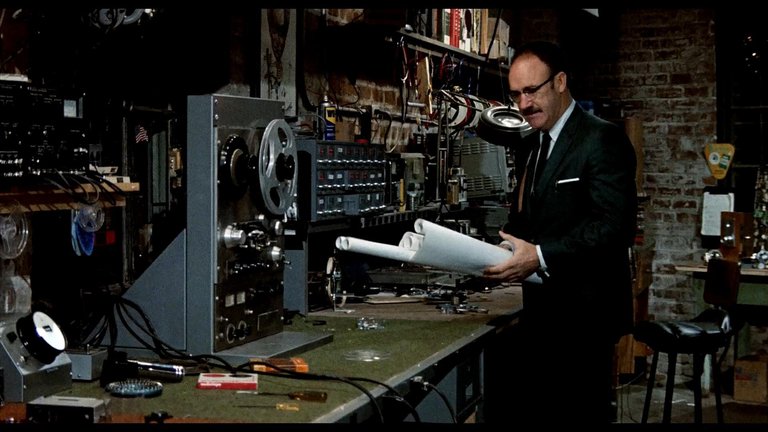
Harry then decides not to hand over the tapes and when he listens to them again he discovers something in the conversation that he hadn't noticed before, a message that could be a triviality or a threat. Caul feels that the spied couple is in danger, but what to do? How to act? The first commandment of his job is not to get involved, stay out of it, do the job, get paid and forget about it; so why does he feel like intervening this time?
Harry decide entonces no entregar las cintas y al escucharlas nuevamente descubre algo en la conversación que no había notado antes, un mensaje que puede ser una trivialidad o una amenaza. Caul siente que la pareja espiada está en peligro, pero ¿qué hacer? ¿como actuar? El primer mandamiento de su trabajo es no involucrarse, mantenerse al margen, cumplir con el trabajo, cobrar y olvidarse del asunto; entonces, ¿por qué esta vez siente deseos de intervenir?
The reason is that Harry is carrying the guilt of an episode from his past. An investigation he carried out led to the death of three people. He didn't kill them, of course, but is he responsible for those deaths? His religious upbringing leads him to feel that he is and when this new incident occurs in which he feels that someone else is in danger, he decides to prevent a tragedy from happening, but is that really the case? Is it possible that the phrase he heard should not be taken so literally? Since the film is a psychological thriller, couldn't Caul be overreacting and imagining things and conspiracies that aren't there? At times it seems that way, but at others it seems that Harry is right, that there's something strange about that businessman, his assistant and the phrases recorded in the conversation that the investigator hears over and over again to the point of becoming obsessed with people and dreaming about them. Harry's personal drama is joined by other, less tense characters and situations that allow us to see the kind of person he is beyond his job: a man with a sense of humor, but a greater sense of what is right, very religious, who likes to play the saxophone and who leads a rather solitary life, largely because he is unable to trust anyone, to open up completely. His job is to listen to other people's secrets, but his life consists of jealously safeguarding his own secrets.
La razón es que Harry carga a cuestas la culpa de un episodio de su pasado. Una investigación que llevó a cabo condujo a la muerte de tres personas. Él no las mató, claro, pero ¿es responsable de esas muertes? Su formación religiosa lo conduce a sentir que sí y cuando se presenta este nuevo incidente en el que siente que alguien más corre peligro, decide impedir que ocurra una tragedia, pero ¿es realmente así? ¿es posible que la frase que escuchó no haya que tomarla tan literal? Siendo que la película es un thriller psicológico, ¿no puede Caul estar reaccionando en demasía e imaginando cosas y conspiraciones que no están allí? En algunos momentos pareciera que es así, pero en otros pareciera que Harry tiene razón, que hay algo raro en ese empresario, en su asistente y en las frases grabadas en la conversación que el investigador escucha una y otra vez hasta el punto de obsesionarse con las personas y soñar con ellas. A este drama personal de Harry se suman otros personajes y situaciones menos tensas que nos permiten ver el tipo de persona que es él más allá del trabajo: un hombre con sentido del humor, pero mayor sentido de lo correcto, muy religioso, que le gusta tocar el saxofón y que lleva una vida bastante solitaria, en gran parte porque es incapaz de confiar en alguien, de abrirse completamente. Su trabajo es escuchar los secretos de los demás, pero su vida consiste en salvaguardar celosamente sus propios secretos.
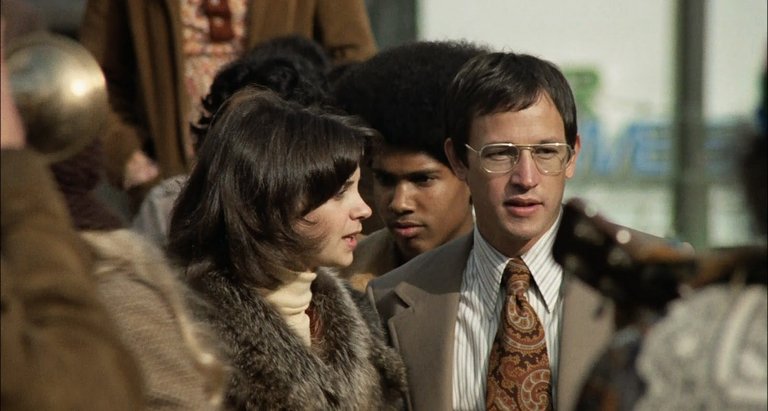
Coppola confessed that Michelangelo Antonioni's memorable Blow-Up (based on a story by Julio Cortázar) was a great source of inspiration for the tone and aesthetics of The Conversation. And it shows. But there are also things that are typical of the director of The Godfather and some scenes that are close to the horror films of those years or to the B-movies in which it was more common to see bloody scenes, which do not reach the level of gore, but which can generate some impact on the viewer.
Coppola confesó que la recordada Blow-Up de Michelangelo Antonioni (basada en un relato de Julio Cortázar) fue una gran fuente de inspiración para el tono y la estética de The Conversation. Y eso se nota. Pero además hay también cosas propias del director de El Padrino y algunas escenas que se acercan al cine de terror de aquellos años o a las películas de serie B en las que era más común ver escenas sangrientas, que no llegan a gore, pero que sí pueden generar algún impacto en el espectador.
I thought the film was good, well made and Gene Hackman was impeccable in his role. However, I didn't like it very much, or I didn't find it memorable, beyond a few scenes and that wonderful final sequence, those last few minutes that end with Harry playing the saxophone in the middle of a ruined apartment that could very well symbolize his mind. It's interesting how the story returns again and again to the conversation in the title and revises it in various ways, but if we're talking about the subject of spying on others, the German Das Leben der Anderen (The Lives of Others) seems superior to me, although it should be noted that it's thirty years more recent as well. However, what I do highlight about the plot of The Conversation is that it makes us think and debate about issues such as private life, does it still exist?, the right of others to poke their noses inside our doors, guilt, remorse, work ethics, the weight of secrets and the responsibility of accepting the consequences and harm that our own decisions can cause to other people. He who takes action on information is obviously responsible for what he does with that information, but what about the person who provided it? Should that person know in advance what that information will be used for? It gives us something to think about for a while and for that reason alone we appreciate this Coppola film. How many of you have seen it? I'll read you in the comments.
La película me pareció buena, está bien hecha y Gene Hackman está impecable en su papel. Sin embargo, no me gustó mucho, o no me pareció memorable, más allá de algunas escenas y de esa maravillosa secuencia final, esos últimos minutos que cierran con Harry tocando el saxofón en medio de un departamento en ruinas que bien puede simbolizar su mente. Es interesante cómo la historia vuelve una y otra vez a la conversación del título y la revisa de diversas maneras, pero si hablamos del tema de espiar a los demás, la alemana Das Leben der Anderen (The Lives of Others) me parece superior, aunque hay que aclarar que es treinta años más reciente también. Sin embargo, lo que sí destaco de la trama de The Conversation es que nos hace pensar y debatir sobre temas como la vida privada, ¿sigue existiendo?, el derecho de los demás a asomar sus narices dentro de nuestras puertas, la culpa, los remordimientos, la ética laboral, el peso de los secretos y la responsabilidad de aceptar las consecuencias y perjuicios que nuestras propias decisiones pueden ocasionar a las demás personas. Aquel que toma acciones sobre una información, obviamente es responsable de lo que hace con esa información, pero ¿y aquel que se la suministró? ¿debería esa persona saber de antemano para qué va a ser utilizada esa información? Da para pensar un buen rato y sólo por eso se agradece esta película de Coppola, ¿cuántos de ustedes la han visto? Los leo en los comentarios.
Reseñado por @cristiancaicedo
Other posts that may interest you | Otros posts que pueden interesarte:
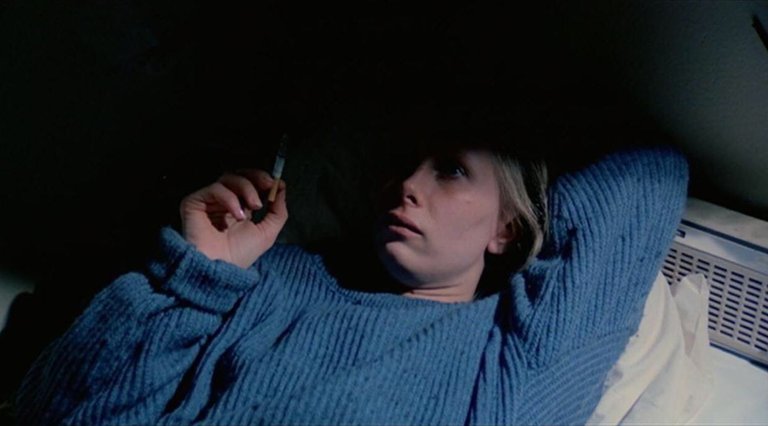 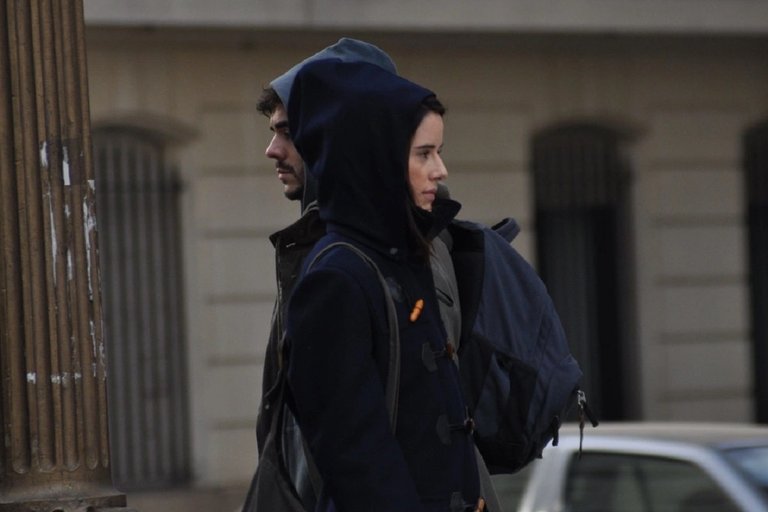  |
|---|
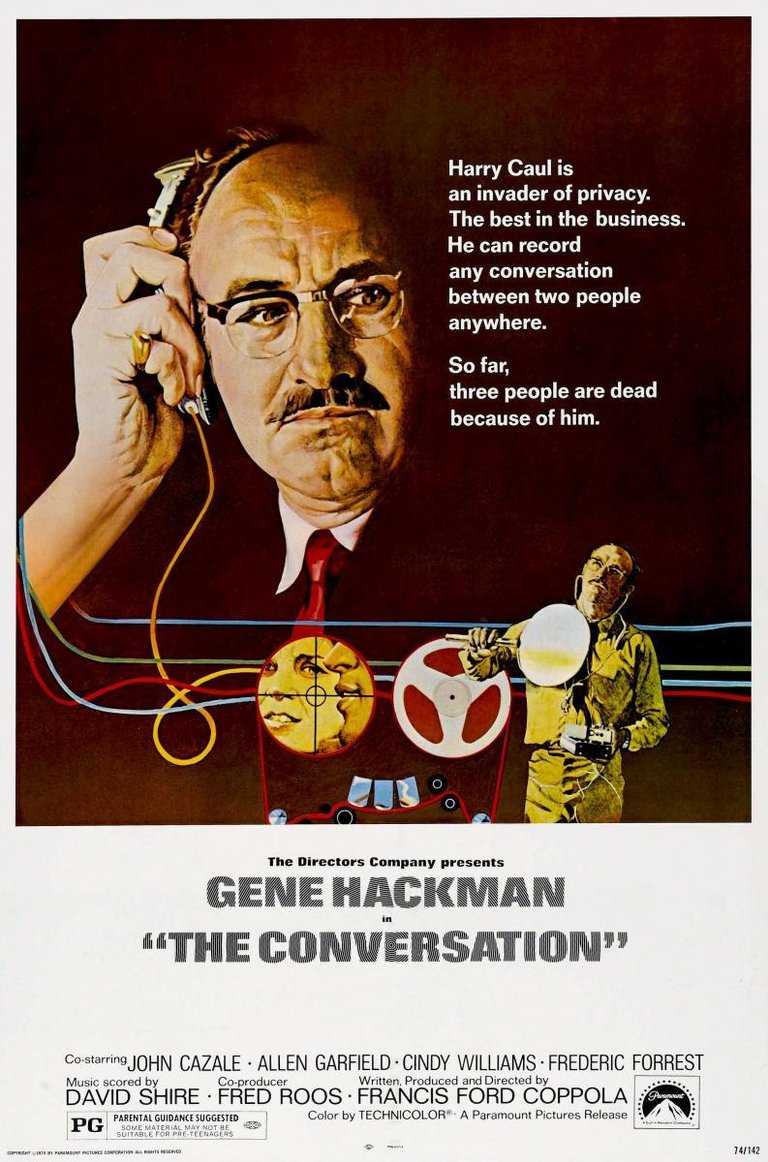
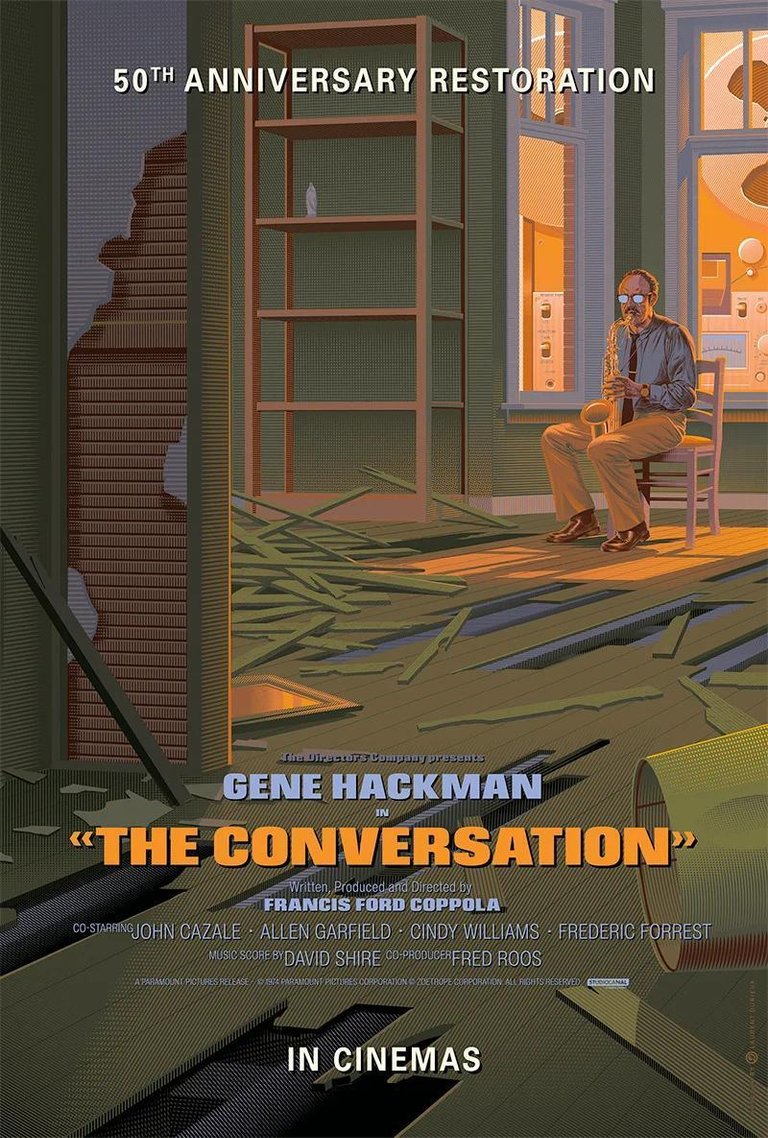
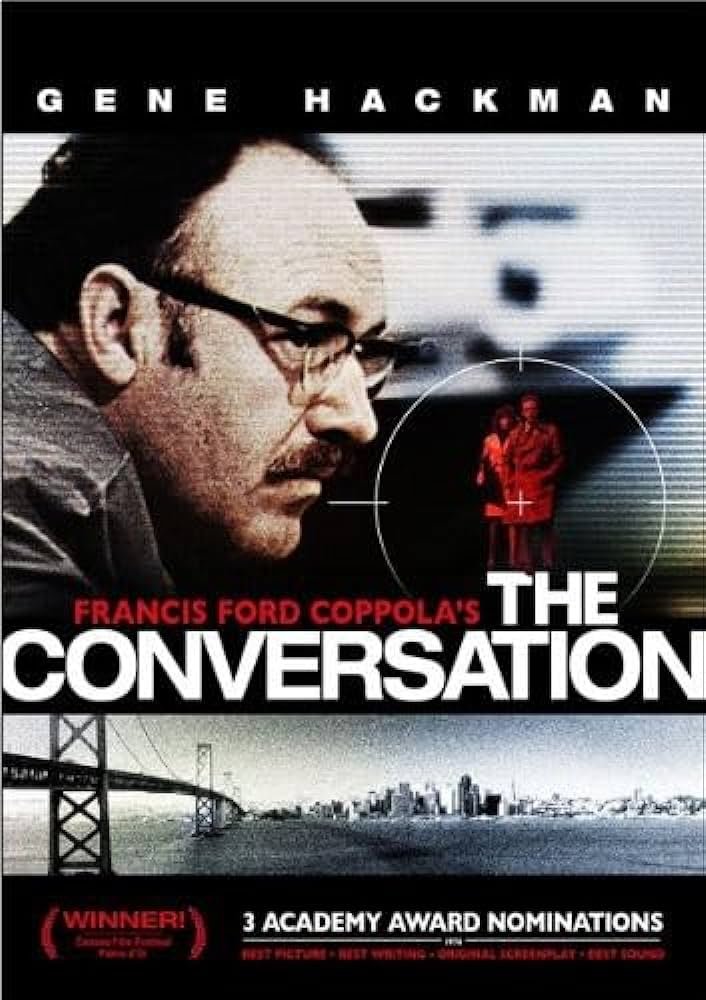
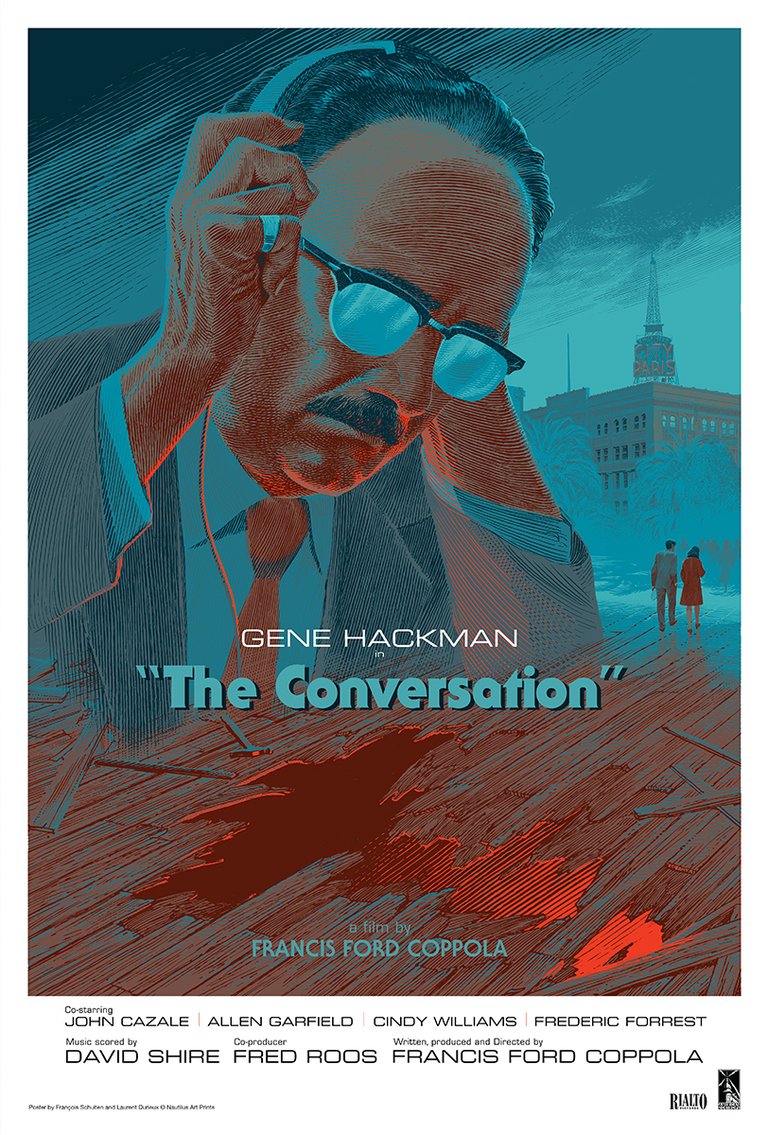
I watched this a very long time ago, probably when it came out. What I remember about it is the sinister atmosphere--almost a paranoid. And I remember Hackman. I don't think I've ever watched Hackman movie and lost interest. He's one of those actors who always make it worth your while to tune in.
And you're right about the 70s. We were still in the Cold War and everybody was spying on everybody. Brings to mind Marathon Man. The same atmosphere of paranoia, of being watched. Another cast that inevitably makes a movie memorable.
No doubt Hackman is one of those actors. I haven't seen Marathon Man but it's on my list. Thank you so much for leaving your comment.
Esta pelicula se ve que es un clásico. No la he visto, tendría que darle un vistazo para tener una opinión. La pondré en mi lista para ver qué tal.
Saludos.
Sí, es famosa en la filmografía de Coppola. Si te llama la atención la trama, también te recomiendo la alemana que mencioné en el post. Saludos.
Hackman es un excelente actor que actuó en contacto en Francia. Esta no la he visto pero me parece muy interesante
Esa que mencionas no la he visto, la voy a buscar. Saludos.